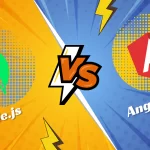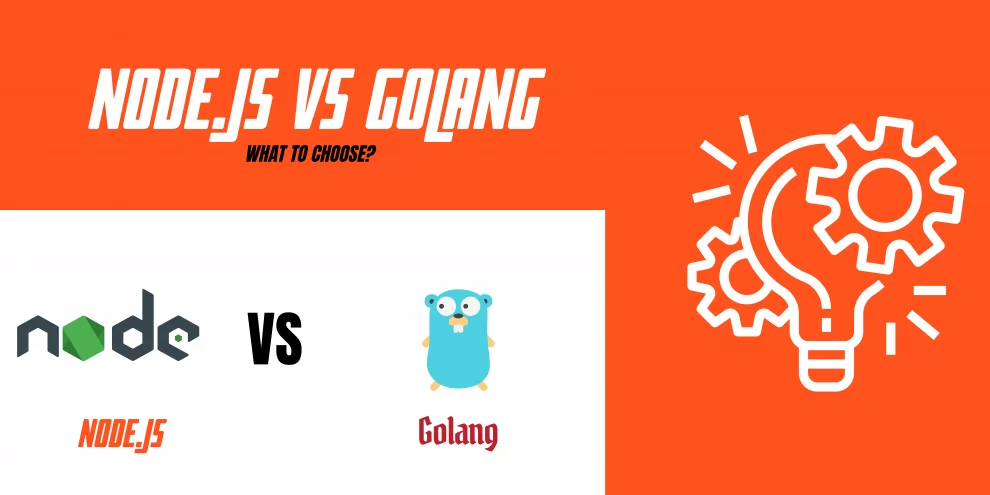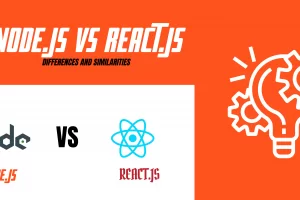In the realm of modern software development, choosing the right programming language can significantly impact the success and efficiency of a project. Two prominent contenders in the web development landscape are Node.js and Golang. Deciding between the two necessitates a thoughtful evaluation of their features, strengths, and weaknesses. This article sets out to explore the dynamics of Node.js vs Golang: Choose Wisely.
Node.js, an open-source, cross-platform runtime environment, has gained immense popularity for executing JavaScript code outside of web browsers. Its event-driven, non-blocking I/O model, built on the V8 JavaScript runtime, lends itself well to high concurrency scenarios. On the other hand, Golang, also known as Go, is a statically typed, compiled language designed for concurrency and efficiency. Developed by Google, Golang’s design prioritizes simplicity and performance.
This discussion aims to provide a comprehensive comparison of Node.js and Golang, helping developers and project stakeholders make informed decisions based on the unique requirements of their projects. We will delve into their respective advantages, use cases, industry adoption, community support, and more. Ultimately, our goal is to guide you in the right direction as you navigate the decision of Node.js vs Golang: Choose Wisely.
Overview of Node.js
Node.js, initially released in 2009 by Ryan Dahl, has since become a dominant force in the realm of server-side programming. It is an open-source, cross-platform runtime environment that leverages the V8 JavaScript engine, originally developed for Google Chrome. Node.js allows developers to run JavaScript code outside of a web browser, transforming JavaScript from a client-side language into a versatile server-side language.
Architecture and Event-Driven Model
At the heart of Node.js is its event-driven, non-blocking I/O model. This architecture enables Node.js to handle a large number of concurrent connections efficiently, making it an excellent choice for applications that require real-time updates and high concurrency.
In the traditional synchronous model, handling each client request would typically result in blocking, where the server waits for I/O operations to complete before proceeding to the next task. Node.js, however, utilizes an asynchronous, event-driven approach. When an I/O operation is initiated, Node.js registers a callback function and proceeds to the next operation without waiting for completion. When the I/O operation is finished, the corresponding callback is executed. This mechanism allows for efficient handling of multiple tasks simultaneously.
Advantages of Node.js
Efficiency and Performance:
Node.js is renowned for its efficiency in handling a massive number of connections concurrently. The event-driven, non-blocking architecture ensures optimal performance and responsiveness, making it suitable for applications requiring high throughput.Vast Ecosystem:
Node.js benefits from a vast ecosystem of open-source libraries and packages, which are easily accessible through npm (Node Package Manager). This rich set of libraries facilitates faster development by allowing developers to reuse and integrate pre-built components.JavaScript Familiarity:
Node.js utilizes JavaScript, a widely adopted and versatile programming language. Developers familiar with JavaScript can leverage their existing knowledge and skills, enabling a smoother transition to server-side development.
Also Read: 12 Reasons to Choose Node.Js for Product Development
Overview of Golang
Golang, often referred to as Go, statically types and compiles programming language. Google engineers Robert Griesemer, Rob Pike, and Ken Thompson initially developed it. They introduced it as an open-source language to the public in 2009, with a focus on simplicity, efficiency, and concurrency.
Simplicity and Efficiency
Golang is characterized by its clean and minimalistic syntax, promoting ease of use and readability. The language was designed to reduce complexity and eliminate unnecessary features, resulting in a straightforward and efficient programming experience.
Golang’s compilation process is notably fast, generating native machine code that runs efficiently on various platforms. Its efficiency is further underscored by the language’s ability to handle concurrent tasks seamlessly.
Concurrency Support
One of the standout features of Golang is its strong support for concurrency. Golang introduces goroutines, which are lightweight, concurrent threads of execution. These goroutines enable efficient parallel processing of tasks, making Golang particularly well-suited for concurrent applications and systems.
In addition to goroutines, Golang provides channels, which facilitate communication and synchronization between goroutines. This built-in concurrency model simplifies the handling of concurrent operations and enhances application performance.
Advantages of Golang
Concurrency and Scalability:
Golang’s inherent support for concurrency, exemplified by goroutines and channels, allows for efficient parallel processing and scalability, making it an excellent choice for high-performance applications.Performance:
Golang’s compiled nature results in highly optimized and fast-running applications. Its efficiency makes it suitable for applications that demand high performance and rapid execution.Strong Standard Library:
Golang boasts a comprehensive standard library that covers a wide range of functionalities, reducing the need for third-party dependencies and enabling faster development.
Node.js vs Golang: Choose Wisely
In the rapidly evolving landscape of web development, the choice of programming language is paramount to the success of any project. Node.js and Golang stand out as two powerful options, each with its unique strengths and purposes. To navigate this decision effectively, let’s delve into a comparative analysis of Node.js vs Golang: Choose Wisely.
Performance and Concurrency
Node.js:
Node.js is renowned for its efficiency in handling a large number of connections concurrently, making it optimal for applications requiring high throughput. Its event-driven, non-blocking I/O model ensures optimal performance, especially in real-time applications.Golang:
Golang, with its native compilation and strong concurrency support through goroutines and channels, excels in raw performance and efficient handling of concurrent tasks. This makes it ideal for applications that demand strong concurrency and scalability.
In the realm of performance and concurrency, Golang stands out due to its compiled nature and built-in concurrency features, offering a slight edge over Node.js.
Learning Curve and Development Speed
Node.js:
Node.js leverages JavaScript, a language widely known and used. Developers familiar with JavaScript can quickly adapt to Node.js, reducing the learning curve and accelerating development.Golang:
Golang’s simplicity and clean syntax contribute to a relatively short learning curve. Developers transitioning from other languages often find it easy to grasp, enabling speedy development.
Both languages prioritize developer efficiency, but Node.js gains an advantage for JavaScript-experienced developers, leveraging their existing knowledge and skills.
Ecosystem and Libraries
Node.js:
Node.js has a mature and expansive ecosystem, boasting a vast array of libraries and modules available through npm. This extensive ecosystem accelerates development by providing pre-built solutions for various functionalities.Golang:
Golang’s ecosystem, while younger, is rapidly growing. It emphasizes simplicity and efficiency, with a focus on a strong standard library. Though not as vast as Node.js, it offers quality libraries for essential functionalities.
Node.js holds an edge in terms of ecosystem maturity and the abundance of readily available third-party modules.
Use Cases
Node.js:
Node.js shines in real-time applications, APIs, microservices, and single-page applications. Its strength lies in efficient event handling and non-blocking I/O, making it well-suited for applications requiring rapid, real-time updates.Golang:
Golang is ideal for networking tools, backend systems, servers, and cloud-based applications. Its robust concurrency support and compiled nature make it excellent for applications that require strong performance and scalability.
Ultimately, the choice between Node.js and Golang hinges on the specific needs of your project. If you prioritize performance, efficient concurrency management, and a straightforward learning curve, Golang might be the right fit. Conversely, if a familiar language and a vast ecosystem are crucial, Node.js could be the ideal choice.
Also Read: Microservices vs. APIs: What’s the Difference?
Use Cases and Industry Adoption
Let’s delve into the specific use cases where Node.js and Golang shine, along with their adoption in different industries.
Node.js Use Cases
Real-time Applications:
Node.js is an optimal choice for real-time applications, including messaging apps, online gaming platforms, and live-streaming applications. Its event-driven, non-blocking nature enables seamless handling of numerous concurrent connections, providing real-time updates and interactions.APIs and Microservices:
Node.js is commonly used to build lightweight APIs and microservices. Its efficient handling of a large number of requests, coupled with its asynchronous capabilities, makes it an excellent fit for applications that require a scalable and responsive backend.Single-Page Applications (SPAs):
Node.js is well-suited for developing Single-Page Applications (SPAs) where speed and responsiveness are crucial for delivering an excellent user experience. Its ability to handle asynchronous operations efficiently aligns with the requirements of modern web applications.
Golang Use Cases
Networking Tools:
Golang is frequently used to develop networking tools and applications due to its strong concurrency support and efficiency. It excels in handling multiple concurrent tasks, making it an ideal choice for applications related to network operations and protocols.Backend Systems and Servers:
Golang’s performance and strong concurrency features make it an excellent choice for building backend systems, servers, and high-traffic applications. Its ability to handle concurrent connections efficiently ensures optimal performance in server-side operations.Cloud-based Applications:
Golang’s ability to handle high concurrency and workload makes it a great fit for cloud-based applications and services. Its performance and efficiency contribute to the scalability and reliability required in cloud environments.
Industry Adoption
Node.js:
Node.js has gained substantial traction in the tech industry and is widely adopted by prominent companies. Industry leaders such as PayPal, Netflix, Uber, LinkedIn, and many others utilize Node.js for its efficiency in handling concurrent connections. Its event-driven, non-blocking architecture makes it a popular choice for large-scale, real-time applications across various domains.Golang:
Golang has been embraced by major tech companies, showcasing its growing adoption in the industry. Companies like Google, Dropbox, Uber, SoundCloud, and others utilize Golang for its performance, efficient concurrency handling, and suitability for scalable applications. Its usage spans a variety of domains, highlighting its versatility and effectiveness in building robust software solutions.
Community and Support
The strength of a programming language is often measured by the robustness of its community and the support available to developers. Let’s delve into the vibrant communities supporting Node.js and Golang.
Node.js Community
Node.js boasts a massive and active community of developers, contributing to the extensive ecosystem of libraries, modules, and frameworks. The community is known for its helpfulness, enthusiasm, and willingness to share knowledge and expertise.
Online Forums:
Various online platforms, such as Stack Overflow, Reddit (r/node), and the official Node.js community forum, serve as hubs for discussions, Q&A, and sharing best practices.Meetups and Events:
Node.js enthusiasts often organize meetups, workshops, and events globally, fostering networking opportunities and knowledge sharing. These gatherings are excellent platforms for developers to connect, learn, and collaborate.Conferences:
Node.js conferences like NodeConf, Node Summit, and Node.js Interactive bring together developers, contributors, and industry experts to discuss the latest trends, advancements, and future of Node.js.
Golang Community
Golang, though relatively newer compared to Node.js, has witnessed rapid growth and has built an enthusiastic and supportive community.
Official Documentation:
The official Golang website provides comprehensive and well-organized documentation, offering developers valuable resources to understand the language and its features.Forums and Discussion Groups:
Golang has dedicated forums like Golang Bridge, Golang Nuts, and the official Golang subreddit (r/golang) where developers can seek help, share experiences, and engage in meaningful discussions.Community-Driven Initiatives:
The Golang community actively contributes to open-source projects and initiatives. The Go GitHub repository itself is a testament to the collaborative efforts of the community to improve and expand the language.Conferences and Meetups:
Golang conferences like GopherCon and Golang UK Conference provide platforms for Golang enthusiasts to come together, share knowledge, and stay updated with the latest developments in the Golang ecosystem.
Also Read: Microservices vs. APIs: What’s the Difference?
Conclusion
In the dynamic world of web development, choosing the right programming language is a critical decision that profoundly influences the success of a project. Node.js vs Golang: Choose Wisely. Node.js and Golang stand as two powerful contenders, each with its unique strengths and purposes. In this comparative analysis of Node.js vs Golang, we’ve explored their performance, use cases, community support, and industry adoption to aid in informed decision-making.
Node.js, with its event-driven, non-blocking architecture, excels in real-time applications, APIs, and single-page applications. Its vast ecosystem and familiarity with JavaScript make it a popular choice, especially for applications requiring high concurrency and rapid, real-time updates.
Golang, on the other hand, prioritizes simplicity, efficiency, and strong concurrency support. It shines in networking tools, backend systems, and cloud-based applications, offering exceptional performance and scalability.
The choice between Node.js and Golang depends on the specific requirements of your project. If you prioritize ease of learning, a vast ecosystem, and real-time application development, Node.js may be the ideal choice. Conversely, if you prioritize performance, concurrency, and efficient handling of high workloads, Golang might suit your project better.















